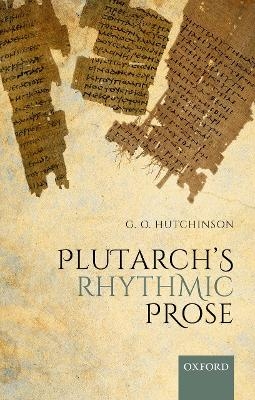
Plutarch's Rhythmic Prose
Oxford University Press (Verlag)
978-0-19-882171-7 (ISBN)
Greek literature is divided, like many literatures, into poetry and prose, but in Greek the difference between them is not that all prose is devoid of firm rhythmic patterning. In the earlier Roman Empire, from 31 BC to about AD 300, much Greek (and Latin) prose was actually written to follow one organized rhythmic system. How much Greek prose adopted this patterning has hitherto been quite unclear; the present volume for the first time establishes an answer on an adequate basis: substantial data drawn from numerous authors. It constitutes the first extensive study of prose-rhythm in later Greek literature.
The book focuses particularly on one of the greatest Imperial works: Plutarch's Lives. It rests on a scansion of the whole work, almost 100,000 phrases. Rhythm is seen to make a vital contribution to the literary analysis of Plutarch's writing, and prose-rhythm is revealed as a means of expression, which draws attention to words and word-groups. Some passages in the Lives pack rhythms together more closely than others; much of the discussion concentrates on such rhythmically dense passages, examining them in detail in commentary form. These passages do not occur randomly, but attract attention to themselves. They are marked out as climactic in the narrative, or as in other ways of highlighted significance: joyful summations, responses to catastrophe, husbands and wives, fathers and sons compared. These remarkable passages make apparent the greatness of Plutarch as a prose-writer - a side of him fairly little considered amid the huge resurgence of work on Plutarch as an author and as a major historical source. Some passages from three Greek novelists, both rhythmic and unrhythmic, are closely analysed too. The book demonstrates how rhythm can be integrated with other aspects of criticism, and how it has the ability to open up new vistas on three prolific centuries of literary history.
Professor G. O. Hutchinson studied at Balliol College, Oxford, as an undergraduate, then took up a position at Christ Church as a Research Lecturer. In 1984 he became Fellow and Tutor in Classics at Exeter College, Oxford, and in 1998 Professor of Greek and Latin Languages and Literature, before being appointed to the Regius Chair of Greek in 2015 and returning to Christ Church.
Frontmatter
List of Abbreviations
List of Rhythms
1: Rhythmic Prose in Imperial Greek Literature
Appendix: details on samples in rhythmical list
2: Rhythmic Prose in Plutarch's Lives
3: Density in Plutarch
4: Life as Art (Plutarch, Timoleon 35)
Appendix: Plut. Tim. 36.2-4, Cras. 22.1, Arat. 24.5, Nepos, Timol. 3.2, 5
5: Taking Fratricide too Hard (Timoleon 5-6)
Appendix: Plut. Comp. Aem. Tim. 41 (2).11-12, Nepos, Timol. 1.5-6
6: Peace Pervades (Numa 20.4-5)
Appendix: Plut. Numa 20.6-10, Dion. Hal. Ant. Rom. 2.76.3, Plut. Fort. Rom. 321c-d, Aesch. Eum. 902-7, Hor. CS 29-32
7: What to Write under a Statue (Cato Maior 19.4-6)
Appendix: Praec. Ger. Reip. 820b, Otho 18.1-2
8: A Dangerous Leap (Alexander 63.2-6)
Appendix: Plut. Alex. Fort. 2 343d-e, Diod. Sic. 17.98.5-99.2, Curt. 9.5.1-3, Arr. Anab. 6.9.5, App. BC 2.637, Just. 12.9.5-7
9: Brutus and his Mirrors (Brutus 10.4-6, 13.7-9, 29.2-3, 40.7-8)
Appendix: App. BC 2.470-2, Plut. Sull. 30.6
10: Daggers and Dangers (Brutus 1.5, 16.4, 52.1-4, 7-8; 19-20)
Appendix: App. BC 2.487, 4.552, Plut. Caes. 68.3-6
11: A Surprise from Cato (Pompey 54.5-9)
Appendix: Plut. Cat. Min. 47-48.4, Caes. 28.7, Dio Cass. 40.50.4, App. BC 2.84-5
12: Mist or Smoke? (Flamininus 4.8-12)
Appendix: Plut. Flam. 4.3-7, Livy 32.11.8-9, 12.1-4
13: The Terrible Retreat (Nicias 26.3-6)
Appendix: Thuc. 7.74.1, 75.4, 7, 77.2, 86.5
14: The Fall of the Crassi (Crassus 23.7-24.3, 25.12-14, 26.6-9, 30.2-5)
Appendix: Dio Cass. 40.21.2-22.1, Thuc. 7.76, Dio Cass. 40.26.2
15: Antigonus and the Athenians Change their Tunes (Demetrius 28, 29.4, 30.2-31.1)
Appendix: Diod. Sic. 20.106.4, Plut. Garr. 506d, [Plut.] Reg. Imp. Apophth. 182b
16: Cornelia Blames Herself (Pompey 74.3-75.2)
Appendix: Livy fr. 45 Jal, Luc. 8.88-105
17: The Deaths of King and Kindred (Agis 16.6-17.5, 17.9-18.3; 19.5-21.1)
Appendix: [Plut.] Apophth. Lac. 216c-d
18: A Distraught Hero (Chariton 3.5.5-6)
19: A Blasée Mother (Plutarch, Cleomenes 43 (22).4-5)
20: Bewilderments of Joy (Heliodorus 10.38.3-4)
21: Chaereas Lives (Chariton 5.8.1-3)
22: The King of Persia is Put in his Place (Chariton 8.5.5-7)
23: A Father Struggles (Heliodorus 10.16.1-2)
24: Some Tears in Achilles Tatius (Achilles 6.7.3-7)
25: More Tears in Achilles Tatius (7.4.3-6)
Conclusion
Endmatter
Bibliography
Index of Passages Discussed
General Index
| Erscheinungsdatum | 23.07.2018 |
|---|---|
| Verlagsort | Oxford |
| Sprache | englisch |
| Maße | 145 x 223 mm |
| Gewicht | 556 g |
| Themenwelt | Literatur ► Biografien / Erfahrungsberichte |
| Literatur ► Essays / Feuilleton | |
| Literatur ► Klassiker / Moderne Klassiker | |
| Geschichte ► Allgemeine Geschichte ► Vor- und Frühgeschichte | |
| Geisteswissenschaften ► Sprach- / Literaturwissenschaft ► Anglistik / Amerikanistik | |
| Geisteswissenschaften ► Sprach- / Literaturwissenschaft ► Literaturwissenschaft | |
| ISBN-10 | 0-19-882171-9 / 0198821719 |
| ISBN-13 | 978-0-19-882171-7 / 9780198821717 |
| Zustand | Neuware |
| Haben Sie eine Frage zum Produkt? |
aus dem Bereich


